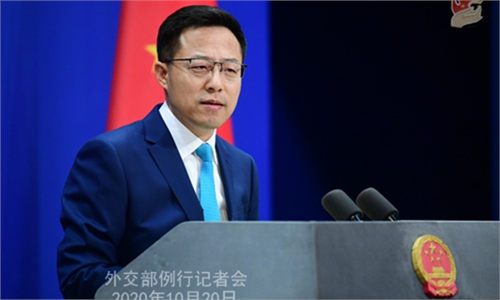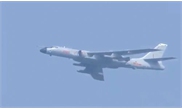China mulls defence law amendments amid profound changes in the world
Threats to development interests added as reasons for defense mobilization
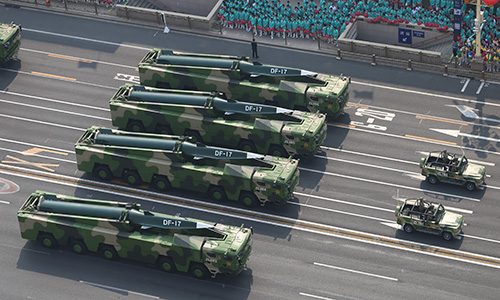
Making their debut in the general public for the first time, DF-17 missiles join the National Day parade held in Beijing on October 1, 2019. Photo: Fan Lingzhi/GT
China is mulling amendments to its Law on National Defence amid profound changes in the world over the past two decades by adding key formulations, including threats to the country's development interests, as reasons for defense mobilization, and involvement in global security governance.
With China's development interests growing alongside the country's peaceful development, it has more and more overseas interests, including strategic transport lanes and Chinese citizens overseas and investments, which could be vulnerable to terrorism, regional instabilities as well as hostile attacks and lockdowns, with the proposed law amendments aiming to work in tandem with military reform to ensure China's peaceful development and growing interests around the world have the backing of defense forces when needed, analysts said on Thursday.
The amendment draft to the Law on National Defence was released on the website of the National People's Congress (NPC) on Wednesday, soliciting opinions from the general public from Wednesday to November 19, after the draft was deliberated by the NPC Standing Committee at a plenary session in Beijing. General Wei Fenghe, a Central Military Commission (CMC) member, a State Councilor and the Minister of National Defense, explained the draft in detail, media reported on Wednesday.
Wei said that the current Law on National Defense, which came into effect in 1997, cannot fully adapt to new missions and the requirements for the development of national defense and the Chinese military; therefore, it needs to be amended.
The world's strategic situation has undergone profound changes over the last 20 years, as the world has seen international strategic competition on the rise, continually increasing global and regional security issues, non-stop armed conflicts and regional warfare, and increasingly obvious instability and uncertainty in international security, Wei said.
Wei also noted that China is in a key period of strategic opportunity for development and is facing even more complicated security threats and challenges.
The draft amendment states that when China's sovereignty, unity, territorial integrity, and security and development interests are under threat, the country can conduct nationwide or local defense mobilization. The "development interests" part is a new addition to the current law.
China's development interests mainly involve two aspects; that is, domestic and overseas, Xu Guangyu, a senior adviser to the China Arms Control and Disarmament Association, told the Global Times on Thursday.
Domestic development interests include the likes of economical operation, and if these normal activities are contained or sabotaged by external forces by, for example, severe trade blockades, it should be viewed as a serious threat, Xu said.
Overseas development interests include China's overseas economic activities including investments and cooperation, such as China-proposed Belt and Road Initiative. China will need to make countermeasures if these operations are intentionally blocked by regional warfare or lockdowns, Xu said.
China's domestic development relies on overseas transport lanes for trade and energy supplies, and China now has a large number of investments overseas, Song Zhongping, a Chinese military expert and TV commentator, told the Global Times on Thursday.
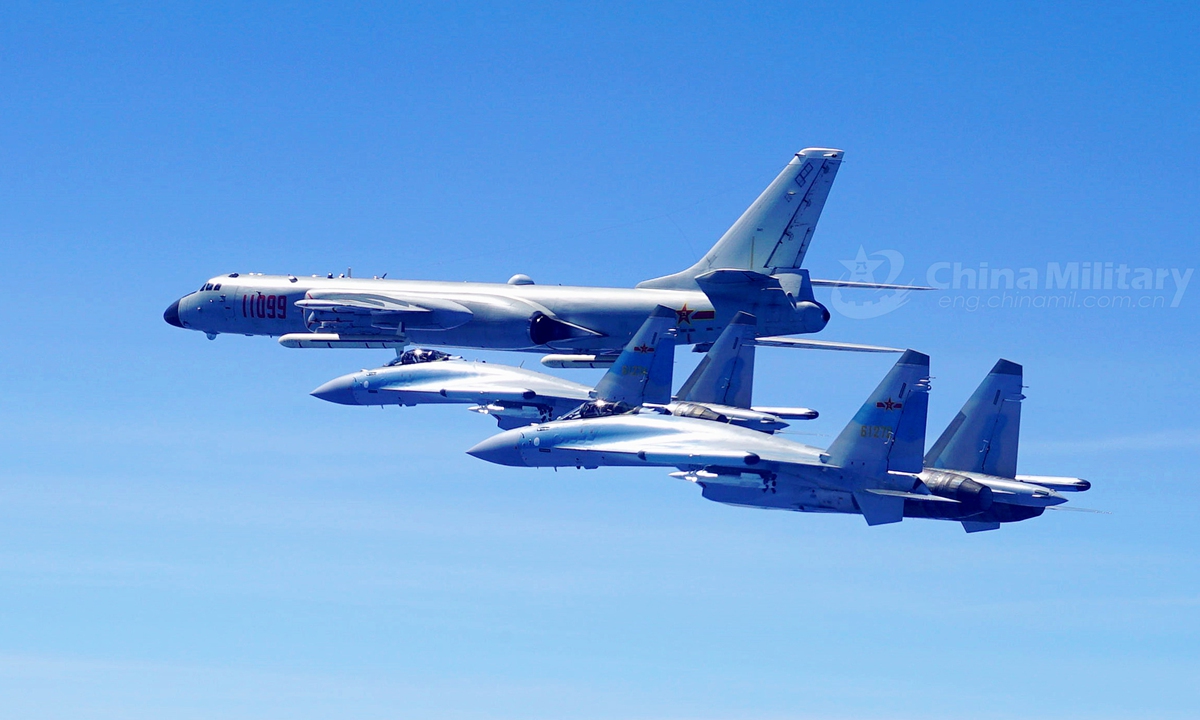
Two Su-35 fighter jets and a H-6K bomber fly in formation on May 11, 2018. The People's Liberation Army (PLA) air force conducted patrol training over China's island of Taiwan on Friday. Su-35 fighter jets flew over the Bashi Channel in formation with the H-6Ks for the first time, which marks a new breakthrough in island patrol patterns, said Shen Jinke, spokesperson for the PLA air force.Photo:China Military
The draft amendment's addition of "development interest" threats stresses the protection of the overseas transport lanes and overseas Chinese investments that could be vulnerable to terrorism, regional instabilities and hostile attacks and lockdowns, the experts said.
Under the current situation, in which the US is eyeing to rally its so-called allies to contain China's development in many ways, including militarily, having a legal basis to counter threats has significant meaning, analysts said.
Xu said that China's defense mobilization will be on a reciprocal basis. Only when the opponent adopts war-like measures will China counter with its own military measures.
In another proposed addition to the law, the draft amendment said that China could use its armed forces to protect overseas Chinese citizens, organizations, units and facilities, thus safeguarding China's overseas interests, and participating in activities including UN peacekeeping missions, international rescues, maritime escorts, joint exercises and anti-terrorism operations following the basic rules of international relations based on the principles of the UN Charter.
If China's overseas interests are seriously threatened, China would be able to use its military capabilities to effectively safeguard its overseas citizens and organizations so the country's interests are not harmed, Song said.
China's military reform, latest national defense strategy, steadily increasing defense budget and the law amendment work in tandem to achieve this goal, analysts said.
China is eyeing to build a "deep-blue-water" navy, with observers naming aircraft carriers, amphibious assault ships and large destroyers as key items in protecting China's overseas interests.
A third and much larger aircraft carrier is under construction in Shanghai, two Type 075 amphibious assault ships have been launched and a third under construction, and eight Type 055 10,000 ton-class destroyers have either entered naval service, preparing for commissioning, or undergoing sea trials, reports said. Another type of more powerful amphibious assault ship, the Type 076, which could feature electromagnetic catapults to launch fixed-wing stealth armed reconnaissance drones, is also under development, foreign reports said.
The draft amendment also states that China will participate in global security governance, join multilateral security talks and push for and set up a set of international rules that is widely accepted, fair and reasonable.
Xu said that such kind of rules are needed as China's economic capacity and global influence grows while having so many connections to other parts of the world at the same time. China also represents many other developing countries that have their own interests to safeguard themselves but do not have loud enough voices to speak for themselves.
Under the amended law, China could send more troops overseas to participate in the likes of UN peacekeeping, anti-piracy, and anti-terrorism operations, Xu predicted.
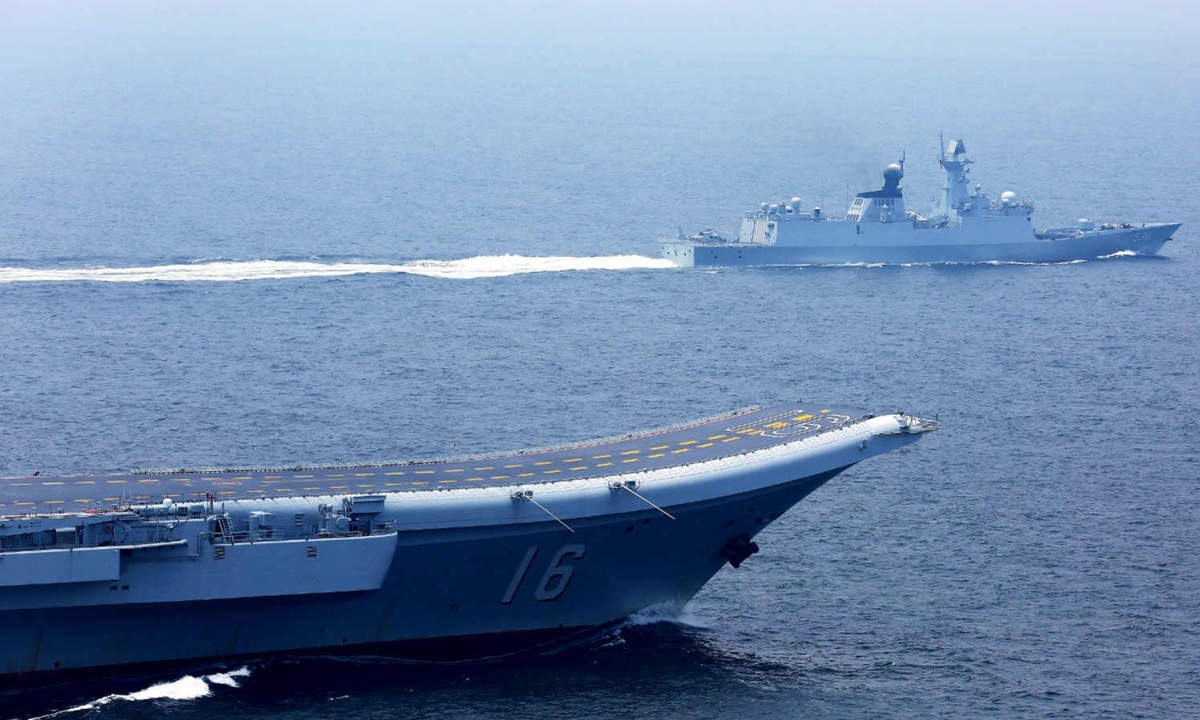
Vessels in the Taiwan Straits, July 20, 2017. /CGTN Photo
New battlefields
Besides border, maritime and air defense, the draft amendment also states that China should take necessary measures to safeguard activities, assets and other interests in other key security fields including outer space, electromagnetic space and networks.
Beijing-based military expert Li Jie told the Global Times on Thursday that the US and its so-called allies have been attempting to contain China not only in traditional defense approaches, but also new (and less visible) fields such as space and networks.
These fields could become "new battlefields" where no bullet is fired, but gaining superiority in them will hold significant advantages in traditional defense fields by winning the war of information, analysts said.
The draft revisions also aim to make Chinese military service a profession revered by the whole of society, which analysts said will guarantee that they better accomplish missions in emergencies, war and occasions in which national sovereignty, security and development interests are being harmed.


